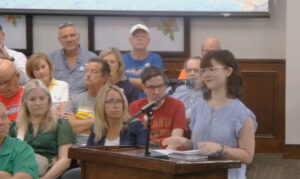A Peachtree City resident has filed an ethics complaint against Mayor Don Haddix for using city funds to settle a libel lawsuit filed over a statement made about former Mayor Harold Logsdon in an email Haddix sent to a city employee.
Steve Thaxton, who has publicly asked Haddix at a council meeting to repay the $9,969 in legal fees, filed the complaint Monday alleging that Haddix committed several ethics violations regarding the matter.
Haddix said Monday night that he has not violated the ethics ordinance and he will be represented at the ethics hearing by an attorney paid for by the city.
Thaxton alleges that by agreeing to settle the lawsuit with Logsdon for $3,000 and by contracting with a private attorney to represent him, Haddix did not seek the consent of his fellow council members, which is normally required for any legal action filed against the city.
“Mr. Haddix benefitted by his negotiated transaction with Mr. Logsdon for a $3,000 settlement payment while at the same time not allowing the governing body of Peachtree City to make the determination of expenditures of funds for this case,” Thaxton wrote in the ethics complaint. “Clearly by appealing to have his legal bills paid by GIRMA and knowing the city had a $25,000 deductible, Mr. Haddix had in effect taken advantage of a way to settle his personal legal issues without regard to the citizens of Peachtree City.”
Haddix contends that he wouldn’t have had to hire a private attorney in the first place if Georgia Interlocal Risk Management Agency had agreed to his initial request to cover the liability. GIRMA denied coverage soon after the lawsuit was first filed in Fayette County Superior Court.
GIRMA’s decision to pay the claim — which resulted in a loss to the city of nearly $10,000 — came after the lawsuit was settled in December.
Thaxton also claims that Haddix’s request for city attorney Ted Meeker to prepare an appeal package to seek the GIRMA funding was an ethical violation for Haddix because city ordinance prevents the use of the city attorney for “personal or private business.”
“Mr. Haddix was not billed by Mr. Meeker for this work and in fact the citizens of Peachtree City were ultimately billed for $110 on Feb. 21, 2012 as a result of Mr. Meeker’s time spent on this action,” Thaxton said in the ethics complaint.
Thaxton also accuses Haddix of failing to notify his fellow council members of his hiring attorney John Mrosek to represent him, specifically because Mrosek at the time was suing the city in a separate claim in federal court over maintenance of a stormwater detention pond adjacent to Mrosek’s home.
The ethics complaint also accuses Haddix of violating several portions of the city’s personnel policy, including one forbidding “discourteous treatment of the public or other employees.”
Haddix said the city will have to fund an attorney to represent him and another attorney to advise the ethics board because City Attorney Ted Meeker will not be able to participate in either function since he is listed as a potential witness in the hearing, Haddix said.
Some council members were outraged when the GIRMA payment came to light in May because it was thought since Haddix was sued personally and not in his official capacity as mayor, the city would not have to pay for his legal fees.
GIRMA, however, ultimately decided that since the potentially libelous statement occurred in an email Haddix sent to a city employee, it was an action that happened during the course of his official duties and therefore the claim should be paid.
A GIRMA official also indicated in a letter that had the agency known the statement in question was contained in an email to a city employee, Haddix would have been covered from the outset of the case.
Several weeks after the GIRMA payment came to light, council decided to make a “budget adjustment” to reduce Haddix’s salary from $750 a month to just under $75 a month for the remainder of the fiscal year with the intention of recouping the funds that were paid to settle the lawsuit. That action is likely the first time in city history that a majority of council voted to dock the pay of a fellow elected official.










Leave a Comment
You must be logged in to post a comment.